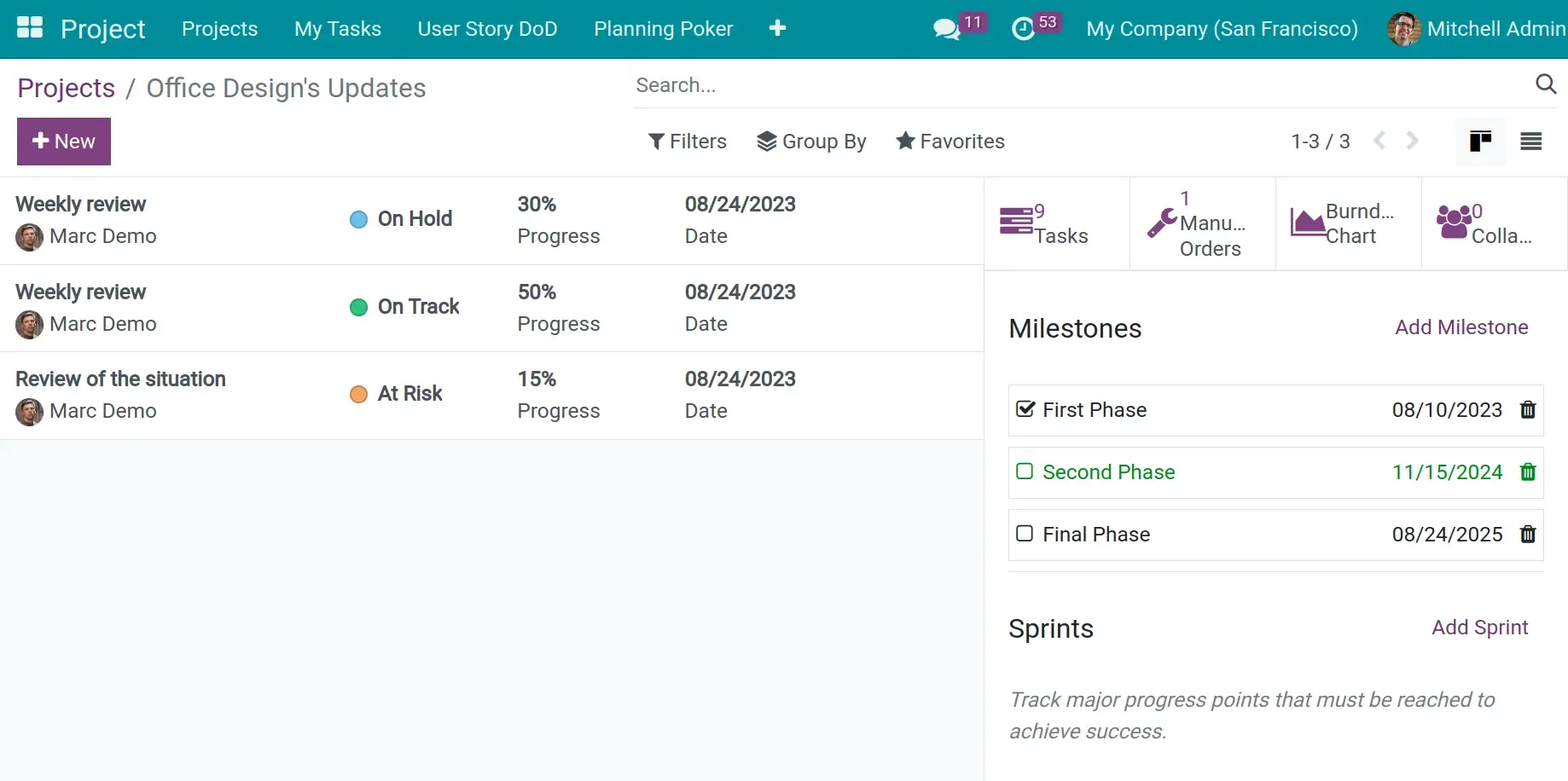In this blog post, we will delve into the importance of understanding project dependencies, how they play a role in project management, real-world examples of project dependencies, and how to navigate cross-project dependencies. We will also introduce Viindoo ERP as a Software Software reamline project dependencies management.
Understanding Project Dependencies
Project dependencies are an integral part of project planning and execution. They are the connections between different tasks, where the completion of one task is dependent on the completion of another. These dependencies can be categorized into four types:
- Finish-to-Start (FS): This is the most common type of dependency, where the completion of one task is necessary for the start of another. For example, before painting a wall, the wall needs to be built first.
- Start-to-Start (SS): In this type of dependency, two tasks can start at the same time, but one task cannot finish until the other has started. An example of this would be starting to prepare a presentation while simultaneously conducting research for it.
- Finish-to-Finish (FF): In this type of dependency, two tasks must finish at the same time. For instance, when building a house, the plumbing and electrical work must be completed at the same time.
- Start-to-Finish (SF): This is the least common type of dependency, where one task must start before another can finish. A real-life example of this would be waiting for a shipment of materials before completing a project.
Understanding these types of dependencies is crucial in project management as they can impact the timeline, resources, and overall success of a project. Identifying and managing dependencies early on in the project planning phase can help prevent delays and ensure smooth execution.

The Importance of Dependencies in Project Management
Dependencies play a critical role in project management as they can have a significant impact on the project's success. Here are some reasons why understanding and managing dependencies is crucial:
- Ensures efficient resource allocation: By identifying dependencies, project managers can allocate resources more efficiently. For instance, if a task is dependent on another task that is running behind schedule, resources can be shifted to the delayed task to ensure it is completed on time.
- Helps with risk management: Dependencies can also help identify potential risks in a project. If a task is dependent on another task that is high-risk, project managers can plan accordingly and mitigate any potential issues.
- Facilitates effective communication: Understanding dependencies allows project managers to communicate effectively with team members and stakeholders. They can provide updates on the progress of tasks and any changes in timelines due to dependencies.
- Improves project planning: Dependencies can help project managers create a more realistic project plan by taking into account the relationships between tasks. This ensures that all tasks are completed in the correct sequence and within the allocated timeframe.
- Prevents delays and bottlenecks: Failure to identify and manage dependencies can lead to delays and bottlenecks in a project. By understanding dependencies, project managers can anticipate any potential roadblocks and take necessary actions to prevent them.

Dependencies in Project Management with Resource management, planning and risk management
The Role of Dependencies in Project Management
Project dependencies can affect various aspects of project management, including time, cost, and quality. Let's take a closer look at how dependencies play a role in these areas:
Time Management
Dependencies have a significant impact on project timelines. When one task is dependent on another, any delay in the first task will automatically affect the timeline of the subsequent task. This can lead to a cascading effect, causing delays in the overall project completion.
To effectively manage dependencies and ensure timely project delivery, project managers need to identify and prioritize critical tasks. They should also have contingency plans in place to mitigate any potential delays caused by dependencies.
Cost Management
Dependencies can also impact project costs. If one task is delayed due to a dependency, it can result in additional costs such as overtime pay or hiring additional resources to complete the task on time. Furthermore, if there are multiple dependencies within a project, it can lead to cost overruns and budget constraints.
To manage dependencies and control costs, project managers must have a clear understanding of the relationships between tasks. They should also regularly monitor the progress of dependent tasks to identify any potential cost implications.
Quality Management
Dependencies can also affect the quality of deliverables in a project. If a task is dependent on another task that is not completed to the required standard, it can impact the quality of the final deliverable. For instance, if a design task is dependent on research, and the research is not thorough, it can result in a subpar design.
To ensure high-quality deliverables, project managers must identify and manage dependencies effectively. They should also communicate the importance of completing dependent tasks to the required standard to team members.
 Tracking cost and time Dependencies in Project Management and define quality of project
Tracking cost and time Dependencies in Project Management and define quality of project
Real-World Examples of Project Dependencies
Project dependencies are present in almost every project, regardless of its size or complexity. Let's take a look at some real-world examples of project dependencies:
- Software Development: In software development projects, there are often dependencies between different modules or components. For instance, before testing a new feature, the code for that feature needs to be written and integrated into the existing system.
- Construction Projects: Construction projects have several dependencies, from obtaining permits to laying the foundation to completing the interior work. Each task is dependent on the completion of the previous one, and any delays can have a significant impact on the project's timeline and budget.
- Marketing Campaigns: In marketing campaigns, there are often dependencies between different tasks such as market research, content creation, and design. For example, before launching a campaign, market research needs to be completed, and content needs to be created based on the research findings.
- Event Planning: Event planning involves various dependencies, from booking a venue to arranging catering to inviting speakers. If one task is delayed, it can affect the entire event's success.
- Product Development: In product development projects, there are dependencies between different stages, such as design, prototyping, and production. If there are delays in one stage, it can impact the overall timeline and quality of the final product.

Navigating Cross-Project Dependencies
In some cases, dependencies can extend beyond a single project and affect multiple projects within an organization. These are known as cross-project dependencies. They can occur when two or more projects share resources, have interdependent tasks, or have a common goal.
Managing cross-project dependencies can be challenging, but it is crucial for the overall success of all projects involved. Here are some tips for navigating cross-project dependencies:
- Identify dependencies early on: It is essential to identify cross-project dependencies as early as possible. This will allow project managers to plan accordingly and allocate resources effectively.
- Communicate with other project managers: Project managers should communicate with each other regularly to stay updated on the progress of their respective projects. This will help them anticipate any potential issues caused by cross-project dependencies.
- Establish clear roles and responsibilities: To avoid confusion and conflicts, it is crucial to establish clear roles and responsibilities for each project manager involved in cross-project dependencies. This will ensure that everyone knows what is expected of them and who to communicate with in case of any issues.
- Use project management software: Project management software, such as Viindoo Software, can help streamline cross-project dependencies management. It allows project managers to track progress, allocate resources, and communicate effectively with team members across multiple projects.

Navigating Cross-Project Dependencies with Viindoo Gantt chart
Streamline Project Dependencies Management with Viindoo ERP
Viindoo Project is a comprehensive project management tool that can help streamline the management of dependencies in your projects. It offers various features that can assist project managers in identifying, tracking, and managing dependencies effectively. Some of these features include:
- Dependency mapping: With Viindoo Project, project managers can easily map out dependencies between tasks and visualize them on a Gantt chart. This allows for better planning and resource allocation.
- Real-time updates: Viindoo Project provides real-time updates on task progress, allowing project managers to stay updated on the status of dependent tasks.
- Resource allocation: The software allows project managers to allocate resources to dependent tasks and monitor their usage. This ensures that resources are utilized efficiently and effectively.
- Collaboration tools: Viindoo Discuss offers various collaboration tools, such as chat and file sharing, that allow team members to communicate and work together seamlessly.
- Customizable reports: The software generates customizable reports that provide insights into project progress, dependencies, and potential risks. This helps project managers make informed decisions and take necessary actions to ensure project success.

The ultimate Project and Task management
FREE FOREVER
Accurate and timely project planning and progress tracking on one and only software.
FAQ
Q: Can dependencies change during a project?
A: Yes, dependencies can change during a project due to various factors such as delays, changes in priorities, or new tasks being added.
Q: How can I identify dependencies in my project?
A: To identify dependencies, you can use techniques such as dependency mapping, critical path analysis, and network diagrams. You can also consult with team members and stakeholders to gain a better understanding of the relationships between tasks.
Q: Can dependencies be avoided?
A: In most cases, dependencies cannot be avoided entirely. However, by identifying and managing them effectively, project managers can minimize their impact on the project's success.
Conclusion
In conclusion, understanding and managing dependencies is crucial for the success of any project. Dependencies play a significant role in project management, affecting time, cost, and quality. By identifying and managing dependencies early on, project managers can ensure efficient resource allocation, mitigate risks, and prevent delays and bottlenecks. Cross-project dependencies can also have a significant impact on project success, and it is essential to navigate them effectively. Viindoo Software offers various features that can help streamline project dependencies management, making it an invaluable tool for project managers.
